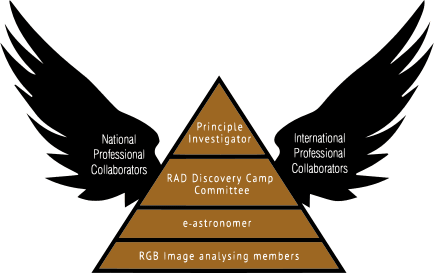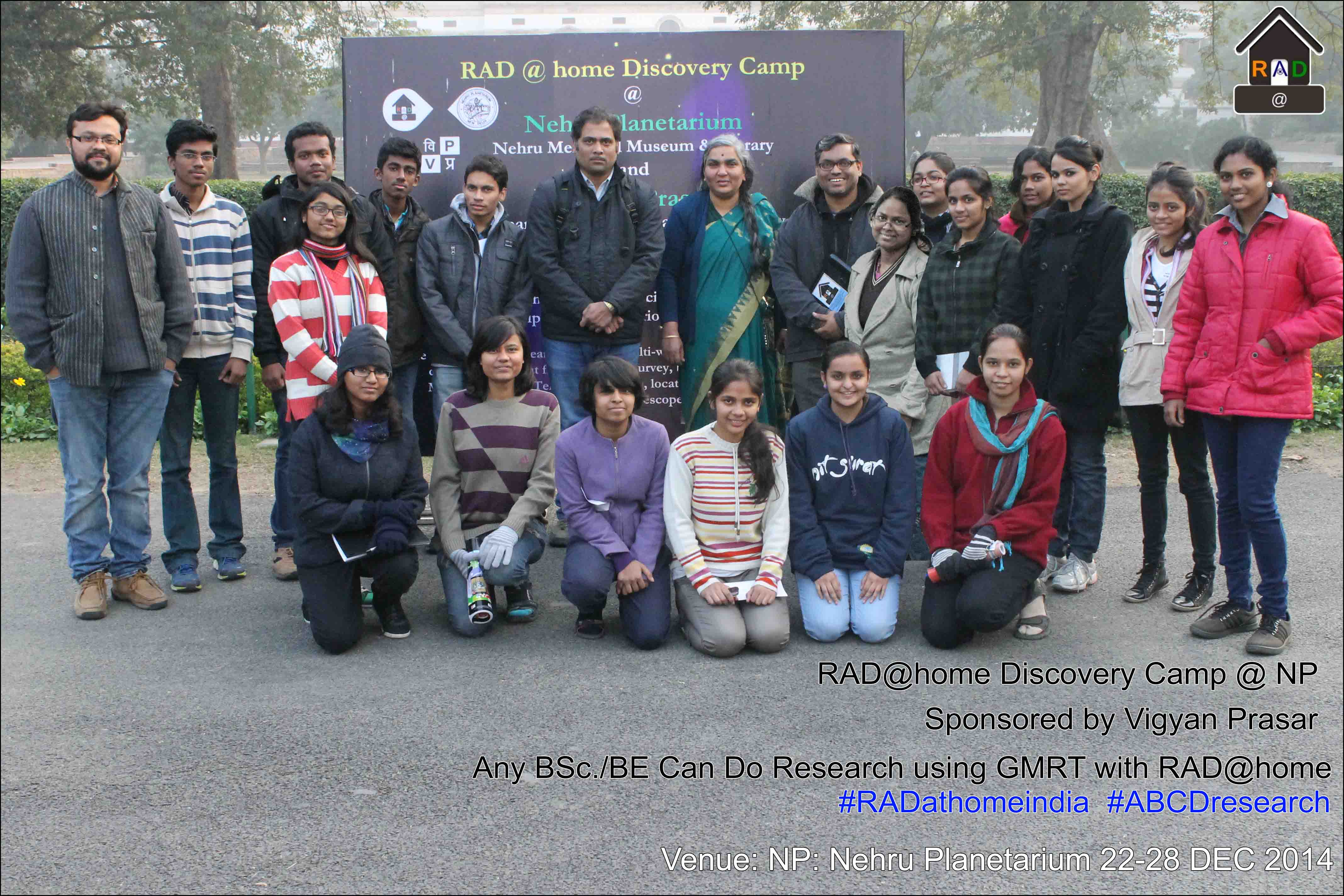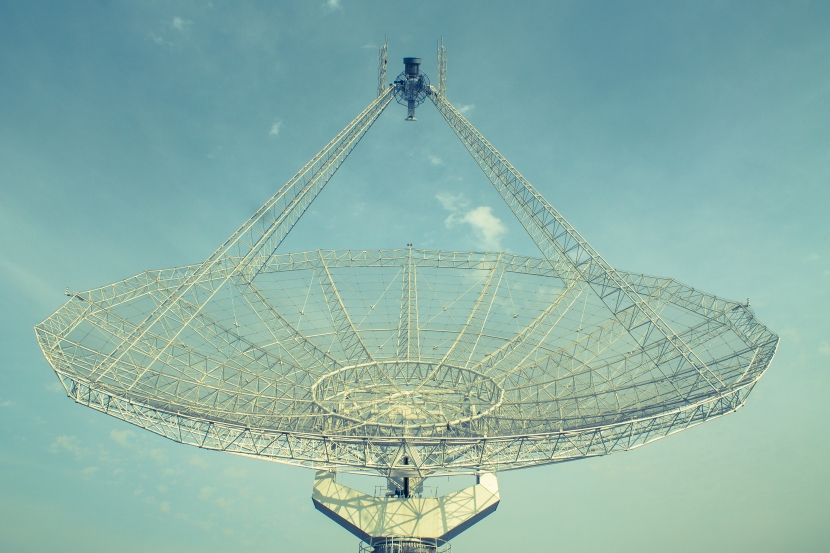
What is RAD@home Astronomy Collaboratory #RADatHomeIndia ?
RAD@home Astronomy Collaboratory #RADatHomeIndia is the first Indian citizen-science research platform in astronomy. Established in 2013, this internationally-acclaimed, zero-funded, zero-infrastructure, nationwide, Inter-University, collaboratory has been established as a platform wherein Any BSc/BE (undergraduate/graduate students/citizens) Can Do multi-wavelength, extragalactic astronomy research ( #ABCDresearch ) by utilizing the power of Internet, particularly the widely used social networking site Facebook & Google.
RAD@home was founded in 2013 by Dr. Ananda Hota with the motive of gathering the unlimited potential of a network of STEM undergraduate/graduate students/citizens of India and then forming a research group (collaboratory), that will help in catering to the rising Big Data problem in astronomy with mega telescope projects like uGMRT, SKA, TMT etc. Being committed to the Indian constitutional mandate of equal opportunity to all, the group’s PAN-India model has so far produced over a thousand trained citizen scientists (e-/i-astronomers) belonging to different socio-economic background. Providing them an opportunity to utilize the radio data (mainly from GMRT) and other freely available archival data (all sky surveys in radio, infrared, optical and UV) to work on understanding black hole-galaxy co-evolution. This people-powered research has received support from various Indian institutions such as ICTS-TIFR (Bangalore), Institute of Physics (Bhubaneswar), Nehru Planetarium (New Delhi), UM-DAE Center of Excellence in Basic Sciences (Mumbai), Harish-Chandra Research Institute (Allahabad), Vigyan Prasar (DST, Govt. of India), IIT (Delhi, BHU & Mandi), IISER (Kolkata & Berhampur), NISER (Bhubaneswar), NIAS & IISc (Bangalore), Vigyan Samagam (DAE, DST, NCSM, Govt of India, SKA-India Consortium), Govt of Odisha & Rajasthan, University Faculty Association etc. It has also got International recognitions from Nature-Index, International Astronomical Union (Office of Astronomy for Development, Office of Astronomy for Education), Square Kilometre Array Observatory (SKAO; international radio telescope) etc.. With such support from nearly 30 organisations, and contributions from similar number of professional scientists, it has been growing as an Inter-University citizen science research startup under the University Grant Commission (UGC; FRP mission, Govt of India). Online group for basic training has ~2500 active learners out of 4700 Indian students/citizens (join here: https://www.facebook.com/groups/RADathome ). A three page pictorial brochure of the Collaboratory can be found here https://radathomeindia.org/brochure
What is RAD@home #ABCDresearch approach ?
#ABCDresearch stands for Any BSc/BE Can Do research using GMRT sitting @home anywhere in India by joining RAD@home collaboratory for free. The collaboratory has a novel approach of training the citizens to get them ready for the research. It has implemented online interactive learning ( #DailyGalaxyRGBC & #NIUgalaxyRGBCanalysis activities ), and online/in-person advanced training ( #DilSeDiscovery ) of the participants. Thus, through RAD@home Discovery Camps (in-person one week or Online for four weekends of a month) or RAD@home Astronomy Workshops (one/two day(s) of weekend online/in-person), citizens/students are trained by professional astronomers. Having learnt the basic concepts, analysis tools and techniques and having understood the research interests of the collaboratory, these participants or trained citizen-scientists become e-astronomers or i-astronomers and continue to learn, discover, and contribute through weekly e-class, e-research sessions conducted by the principal investigator (PI) of the collaboratory. There are ~2500 active learners in ~4700 member online group.
Hence, regardless of their socio-economic setting, interested and scientifically sound STEM individuals, who have access to the Internet and a computer, can not only learn astronomy but also be a part of Discovery through data analyses from home, telescope proposal submission (e.g. GOOD-RAC @ GMRT), and eventually in publications as a co-author in conference/journal research papers internationally.


What is RAD@home Discovery Camps & Astronomy Workshops?
Govt of India (through DST, Office of PSA) promote citizen science research in the country. Nearly 30 institutes from all parts of India support the growth of citizen science research by hosting RAD@home Discovery Camps (one week in person or 4 weekends online) and RAD@home Astronomy Workshops (one full day in person or two days of the weekend online ). Students/citizens for the Camps are selected through Astronomy Workshops with #NIUgalaxyRGBCanaysis activity or through online social media interaction with #DailyGalaxyRGBC activity. Members trained through such Workshops and Camps become trained citizen scientists and are known as i-astronomers and e-astronomers, respectively.
When there is no scheduled Workshop/Camp the route to become i-astronomer is #DailyGalaxyRGBC . The entry stage is getting yourself “RGB qualified” - a science-educated individual capable of creating and analyzing false color, Red-Green-Blue (RGB) images of different galaxies using the RAD@home RGB-maker web-tool ( https://www.radathomeindia.org/rgbmaker ). The detailed process of this exploratory or activity-based learning called #DailyGalaxyRGBC can be found in the announcement of our online group https://www.facebook.com/groups/RADathome . The senior members will interact with the newly joined individual regarding their analyses and inferences. After regular performances one can be promoted to the i-astronomer group for further training and participation in the research through #DilSeDiscovery activity.
The candidates who efficiently analyze these RGB-images and infer the astrophysical meanings correctly are selected by a team of senior e-astronomers and principal investigator for the “RAD@home Discovery Camp @xyz Institute" held at different locations in India. These Camps are held courtesy to various educational and research institutions across India that support RAD@home like ICTS-TIFR (Bangalore), Vigyan Prasar (DST, Govt. of India), UM-DAE Center of Excellence in Basic Sciences (Mumbai), Institute of Physics (Bhubaneswar), Nehru Planetarium (New Delhi), and Harish-Chandra Research Institute (Allahabad) etc. . These institutions not only host the training camp, but also provide support like accommodation, food, travel etc., because of their belief in citizen science research and RAD@home Collaboratory.
In a discovery-camp, the candidate go through a six-day long research training programme. In those six days, the candidate will be in the quest for exotic black hole-galaxy systems which will be a perfect opportunity to learn and interact with different people, from various fields of education, for a collective and collaborative effort in fulfilling the objectives of the collaboratory. During the camp participants are given exposure to various aspects of radio astronomy. They are taught about different types of galaxies with actively accreting black holes (Seyfert, quasars, radio galaxies etc), along with hands-on work with TGSS ADR1/DR5 files from GMRT and other telescopes. Structurally fuzzy and faint, and astronomically-interesting/important objects are further analyzed using SAO ds9 , RAD RGB maker, Aladin, NASA’s Skyview, CDS and NASA/IPAC Extragalactic Database, NASA ADS, CARTA etc..
The research training sessions are carried out in a way that the candidates are made to be acquainted with the socio-scientific objectives of the collaboratory. Along with the scientific goal of black hole galaxy co-evolution through multi-wavelength data, the bigger goal is to achieve Sustainable Developmental Goals like equality and sustainability.
The only technical requirement for the participants in a discovery-camp is an internet-enabled laptop/personal computer installed with SAO ds9 (platform independent). This discovery-method has recently been expanded to larger public participation by #DilSeDiscovery activity where one-day trained or purely online-trained i-astronomers can also submit discoveries like Camp-trained e-astronomers.
What is an RAD@home e class?
Any RAD@home member can join e-class Saturday 2-3 pm with in the Facebook group as a live text-chat discussion. This is to enable everybody, thousands of citizens/students to be skilled in basic RGB-contour multi-wavelength galaxy and radio-galaxy image analyses. The interactive activity that continues is #DailyGalaxyRGBC where on each day, there are different targets to analyse by posting the image and analysis by using #RADatHomeIndia RGB maker web-tool at https://www.radathomeindia.org/rgbmaker . Performance in these e-classes are taken in to consideration for selection to advance online-training as an i-astronomer or Discovery Camp training to be an e-astronomer. Contributions to e-class is considered for various promotions in the Collaboratory.
Advanced e-class (weekly Google Meet (Saturday afternoon)) is for the trained citizen scientists e-astronomers (Camp-trained) and/or i-astronomers (promoted from basic RGB-making group). After successfully completing training in a six-day Discovery camp, participants are now trained-citizen-scientists or called e-astronomers and they take on larger role in the collaboratory. They continue to learn from home and continue to discover cosmic sources from GMRT data through participation in the e-class e-research sessions online. To this end, the e-class is one of the most essential components of RAD@home as it helps in driving forward the collaboratory's mandate of large-scale and internet-based research. This e-class e-research or discussion/training session-held on Google Meet ( or Facebook live-text-chat) is organised by the principal investigator and sometimes by his collaborators or senior e-astronomers. The purpose of an e-class is to learn basic concepts of radio astronomy, black hole-galaxy co-evolution, facilitate discussion among the members that can range from and is not limited to investigating a new-found source, planning future RAD@home events, getting educated on new theoretical concepts and investigation methods, attempting specific research tasks, discussion on new discoveries and breakthroughs around the world and sharing information from relevant sources.
Thus, irrespective of proximity to a astronomy research institution, any citizen with undergraduate science education can take part in astronomy research sitting @home for free and that too using the largest radio telescope of its kind GMRT, pride of India. RAD@home welcomes every citizen to either take part in research and request all private/govt institutions to help spread citizen-science research. You may write to us at our gmail ID "radathomeindia"
To get regular updates do Like our Facebook page and you can help us widen our reach on social media by using the hashtags #ABCDresearch #RADatHomeIndia

